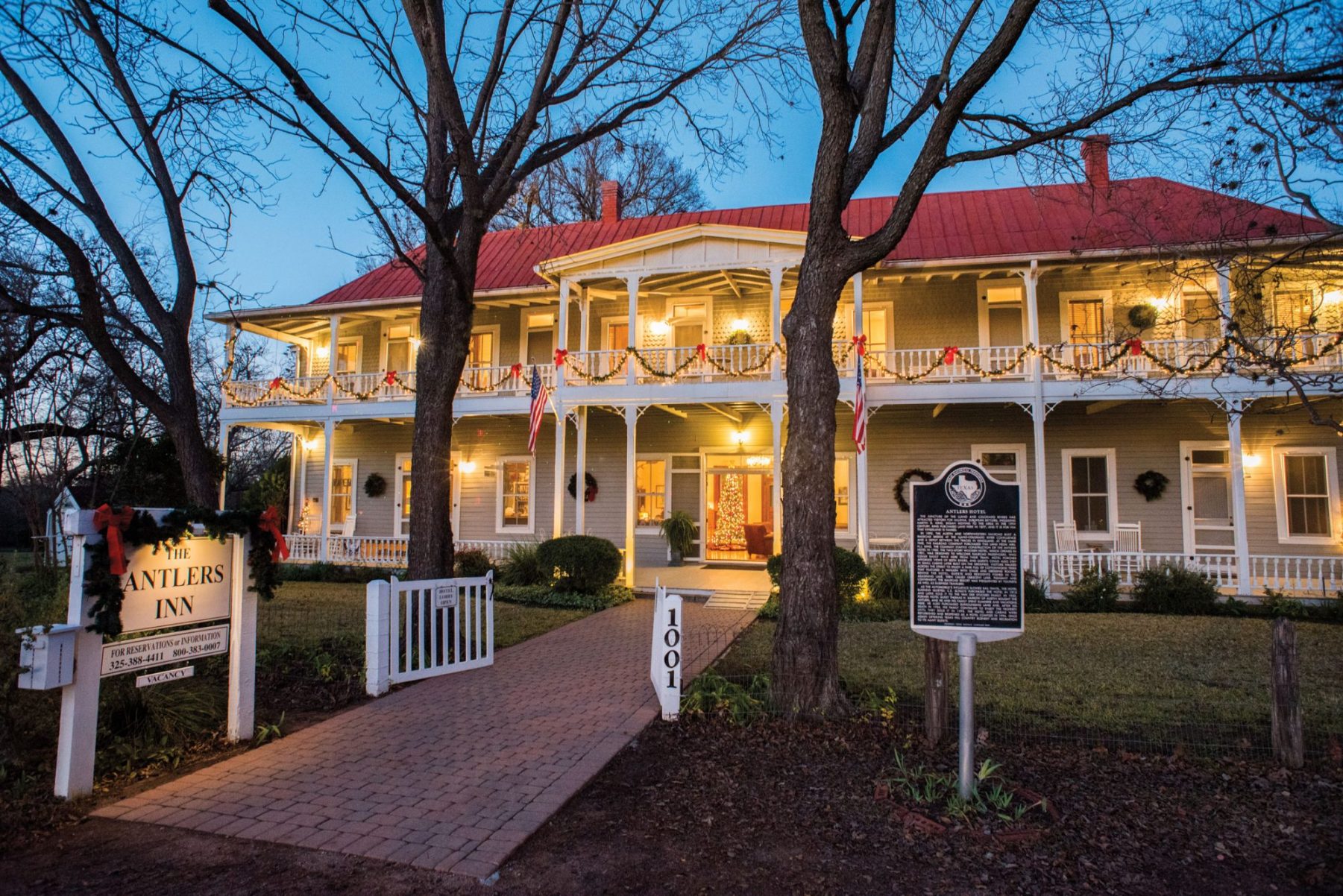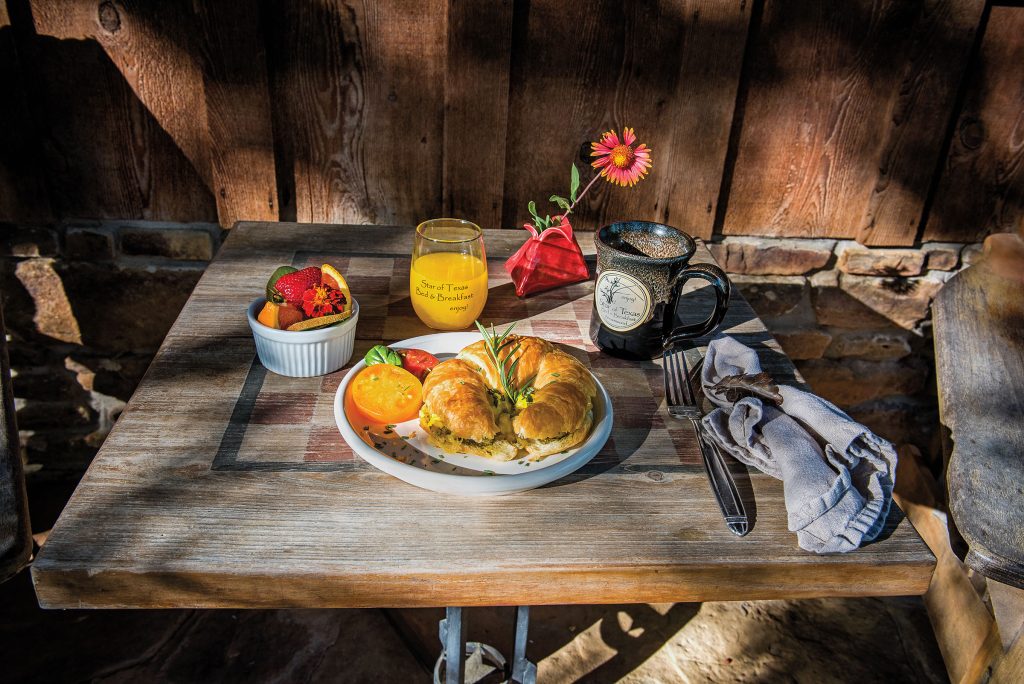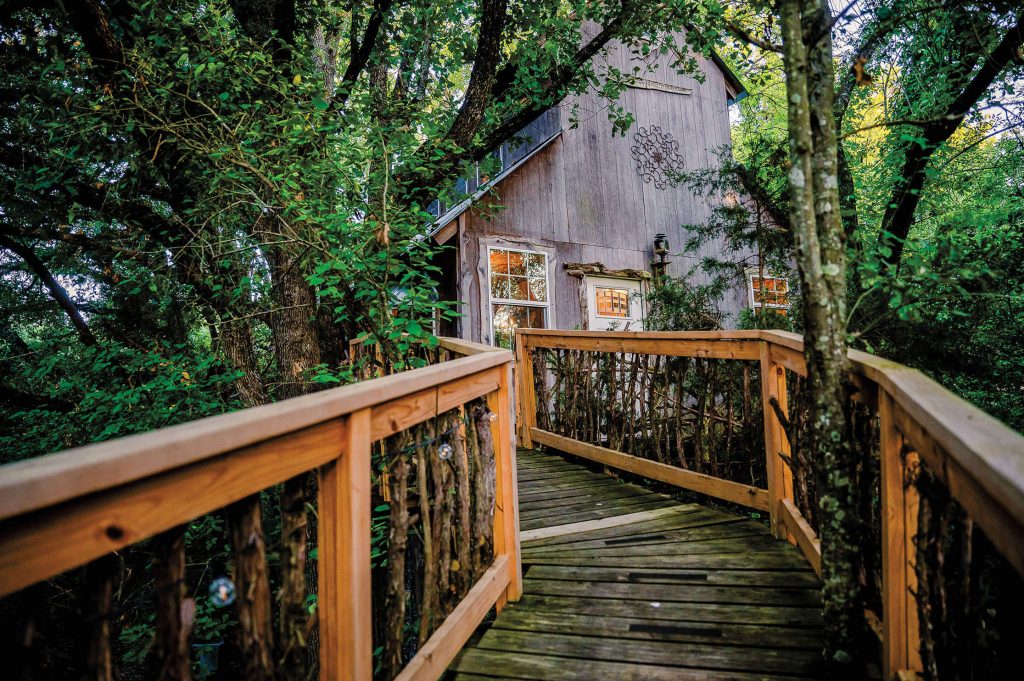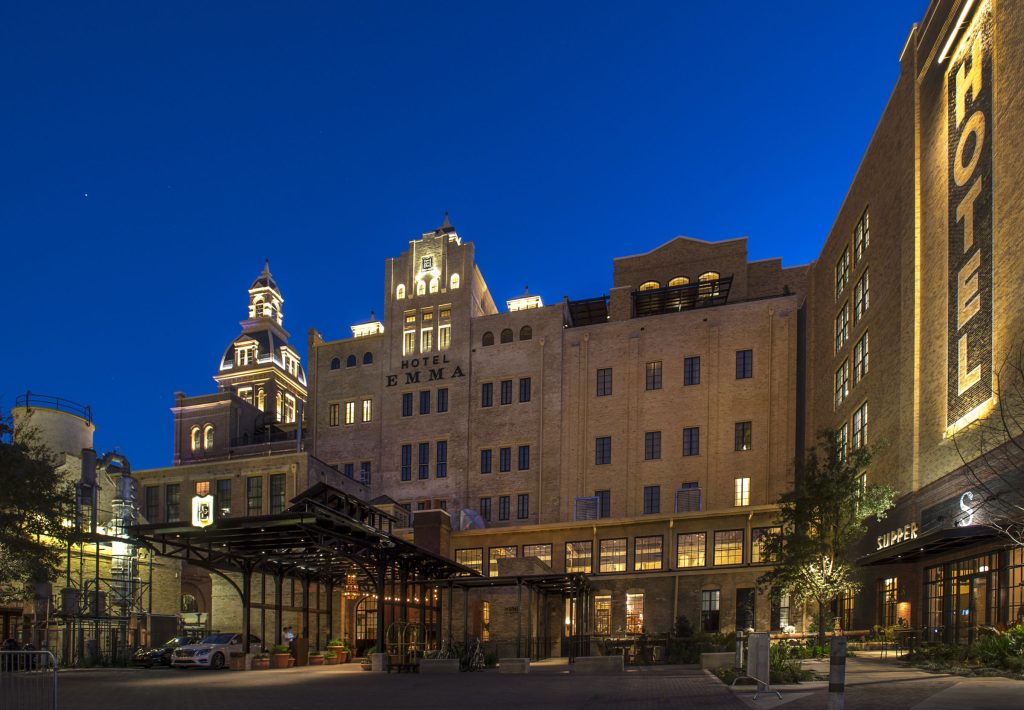There was a time when going home for the holidays meant taking the train. Whether boarding a steam locomotive or the electric interurban, passengers who could afford a ticket enjoyed unheard-of advantages in speed and comfort over horse-drawn coaches and the earliest automobiles.
The service members, scattered family, and traveling salesmen who relied on trains needed places to eat and sleep, leading to a proliferation of railroad hotels in the early 20th century. While most of these hotels have been destroyed or repurposed, a handful across the state, mostly in small towns, preserve the railroad era, when a growing nation was still rooted in local character.
“I think people come here to capture what they feel might be happening in a little town, what they’ve lost in the big cities,” says Jean Mollard, owner of The Redlands Hotel, which opened in 1915 in Palestine, steps from the International-Great Northern Railroad. “Visitors seem to appreciate getting up close and personal with the historical aspects of the building, and even the town.”
Railroads hit their peak in Texas in the 1930s, and train travel flourished until the mid-1900s, when the state began paving rural roads and building the interstate highway system. Though Amtrak still operates three routes in Texas, train travel long ago became an afterthought to cars and airplanes.
Thousands of miles of railroads still crisscross Texas, however, and not far from the rumbling rails, these five historic railroad hotels keep their lights on, shining like locomotive headlamps down nostalgic tracks of the past.
Like countless small towns, Flatonia was built specifically to serve one of the new railroads stitching their way across Texas during the late 19th century. But unlike most of those towns, more than a century later Flatonia has an original railroad hotel that keeps the coffee hot.
The Olle Hotel’s two-story brick building was constructed as a residence in 1901 and converted into a hotel in 1915. In 1926 the Olle family bought the property, and for 40 years the watchful Agnes Olle (commonly known as “Mrs. Olle”) ran the hotel as a boardinghouse for “drummers,” traveling salesmen who rode the rails hawking the latest in gadgetry.
In 1994, Richard and Wilma Schaefer bought the deteriorating property, which has been closed since Mrs. Olle’s death in 1967. The San Antonio couple spent more than four years repairing and renovating the building before reopening it as the Schaefer Haus Bed and Breakfast. In 2004, current owners Kathryn and Dennis Geesaman acquired the property and continued the restoration efforts. Although the 12 rooms now have their own bathrooms and TVs, the restorations retained historical features like transom windows, longleaf pine flooring, and in one room, hooks in the ceiling that Mrs. Olle used to hang her quilting projects.
In two rooms, water closets house the toilets, separated by a wall from the rest of the bathroom. Kathryn explains that in the old days, the first and second floors each had only one toilet and one bath; boarders would line up to use them. A room and meals cost $1 a day, or $1.50 for a bath with shared water (extra for fresh water). Guests today have the luxury of a fresh-water shower, along with a hot breakfast and kolaches.
Regular passenger service stopped in Flatonia in 1949, but trains still pass through multiple times a day. Along the tracks, the historic Tower No. 3 recalls bygone track-switching technology, and the Central Texas Rail History Center exhibits train models and local rail history.
With all this iron horse ambiance, local boosters are lobbying Union Pacific to allow Amtrak’s Sunset Limited route to add a Flatonia stop. If their hopes come true, the Olle Hotel may once again serve passengers just off the train.
The Olle Hotel, 218 S. Market Ave. Rates start at $114.
361-772-0310
ollehotel.com
Holiday Events
Nov. 30
Flatonia businesses open their doors after hours for the Wonderful Winter Wine Walk.
Dec. 1
The Flatonia Civic Center hosts the Merry Market with shopping, homemade cookies and candy, and Santa Claus.
flatoniachamber.com
Slaton would have lost a vital link to its railroading history if it hadn’t been for the quick action of a plumber and a history buff 28 years ago.
One day in 1990, a demolition crew was poised to tear down the vacant 1912 Harvey House building and called plumber Bill Burks to turn off the water. Burks alerted Almarine Childers, president of the Slaton Museum Association. Local lore holds that Childers, who has since passed away, stationed herself between the bulldozer and the dilapidated building until the operator cut the engine.
Today, the restored Slaton Harvey House welcomes visitors as a bed-and-breakfast and event venue harkening to the town’s 1911 origins as a railroad division point and the bygone era when entrepreneur Fred Harvey’s “eating houses” and hotels served passengers along the Atcheson, Topeka and Santa Fe Railway.
Slaton’s Harvey House was a restaurant where passengers would debark for a sit-down meal before the train rolled on. The Fred Harvey Company famously staffed its establishments with “Harvey Girls,” unmarried women recruited from the Midwest and East Coast for jobs out West.
“When people got off the train, they had 20 minutes to eat,” says Jessica Kelly, the former B&B operations manager. “The conductor would telegraph food orders from their last stop, so the meals would be ready when they got here. The Harvey Girls had to be fast and efficient.”
The restored dining hall no longer has its original U-shaped counter, but the yellow stucco walls, decorative wooden paneling, and stained-glass windows reflect the original design. In one corner, the old newsstand displays vintage 1920s periodicals, cigars, candy, and postcards.
Upstairs, the apartments where the Harvey Girls once resided have been renovated into spacious guest rooms with modern amenities and some original features, such as tiled floor in the bathrooms and antique furnishings.
The Slaton Railroad Heritage Association maintains the building as a museum with artifacts and historic photos, including a Harvey Girl uniform, a telegraph machine, and a 1940 menu featuring fresh Spanish mackerel sautéed with lemon
butter for 70 cents.
“Harvey House luxury was intended to inspire people to move West, which was the railroad’s goal,” Kelly says.
Thanks to the valiant stand by Burks and Childers, visitors can still get a feel for that luxury today.
The Slaton Harvey House, 400 Railroad Ave. Rates start at $125.
806-828-5900
slatonharveyhouse.com
Holiday Event
Dec. 1
Slaton’s annual Small Town Christmas features musical performances and decorated Christmas trees on the town square, along with train rides for children between the square and the Slaton Harvey House, where Santa Claus holds forth.
slatonchamberofcommerce.org
In 1901, the Austin and Northwestern Railroad opened the Antlers Hotel on a bank of the Colorado River just above its confluence with the Llano River. The Antlers catered to tourists seeking a riverside resort in Kingsland, a town of a few hundred residents, while also renting rooms to railroad passengers traveling between Austin and Llano.
The rivers still draw visitors to the Antlers, although today Kingsland has more than 6,000 residents and sits on Lake LBJ, which was formed in 1951 and teems with motorboats and shoreline development. While the surroundings have changed, the Antlers retains a peaceful, timeless feeling, ringed by broad porches and looking out over 5 shady acres that lead to a lakeside park.
A mid-1990s restoration preserved the historical atmosphere of the Victorian rooms outfitted with antique furnishings and various artifacts of the inn’s railroad history. The lobby still displays its original chalkboard train bulletin, and in the Kingsland Coffee shop—a former dining hall—a 1910 photograph captures the Antlers’ staff in front of the hotel with small pecan trees that now tower over the building.
The Antlers also offers lodging in several restored cabooses and cottages that once served the railroad, including a depot originally from Muldoon and an 1880s International-Great Northern Railroad coach that’s been converted into an elegant space with a warm interior of wood and natural light.
The train theme continues at the Grand Central Café, which is set in a Queen Anne home. The café attracts diners not only for filling plates of chicken-fried steak and eggs benedict, but also because the house was the setting for the 1974 horror classic The Texas Chainsaw Massacre. The Antlers’ previous owners moved the home to Kingsland from Williamson County in the late 1990s to house the restaurant.
Owners Drew Gerencer and Rick Gregory say they acquired the Antlers in part to maintain the integrity and aesthetic of its historic grounds. As a result, this Kingsland retreat rolls into the 21st century, a reminder of railroad’s romantic heyday.
The Antlers Inn, 1001 King Court. Rates start at $90.
800-383-0007
theantlers.com
Holiday Events
Dec. 1
Kingsland Christmas with Santa Claus at Kingsland Community Center
Dec. 6
Sip and Shop at Kingsland Community Center
Dec. 8
Christmas Gala with dinner and a big-band performance
kingslandcommunitycenter.org
Unusual in Texas today, The Holland Hotel in Alpine not only grew up along the railroad tracks but to this day still sits within a stone’s throw of an active passenger depot. On the hotel’s ground floor, the bay windows of the Century Bar look upon Holland Avenue and the railroad tracks that bisect the town. Every once in a while, you’ll see passengers from the nearby Amtrak depot scurry by, seizing a moment to stretch their legs before jumping back on the train to chug across West Texas.
The Southern Pacific Railroad was Alpine’s lifeline to the world when rancher John Holland built the Holland Hotel in 1908 to serve the cattle business and booming mercury mining industry. In 1928, his son, Clay Holland, hired influential El Paso architects Trost & Trost to design a renovation and expansion that created the hotel as we know it today.
It’s not hard to imagine big-wheel cattlemen smoking stogies and sloshing scotch in the Holland’s expansive lobby, which was restored in the 1980s to its Spanish stylings of stucco walls, wooden crossbeams, and glass chandeliers. During the railroad days, the Holland catered to ranching businessmen, while on the other side of the tracks near the cattle shipping pens, the Hotel Ritchey served blue-
collar cowboys, historian and archeologist David Keller says. The restored Ritchey now houses a bar and café.
“Alpine wouldn’t have existed if it hadn’t been for the Southern Pacific Railway,” says Keller, who wrote Images of America: Alpine. “Any hotel from that early on, before cars supplanted railroads, was essentially a railroad hotel. Those structures are an integral part of the town’s history; they give a sense of the town’s character.”
Alpine character runs deep at the Holland, where cowboys and businesspeople rub shoulders with tourists and Sul Ross State University students at the bar. In the guest rooms, artwork depicts Western scenes such as the desert mountains of Big Bend and cavalry outposts. And if you wait a few minutes, you’re sure to hear the timeless rumble and blasting horn of an approaching train. Don’t worry, the hotel provides earplugs on the bedside table.
The Holland Hotel, 209 W. Holland Ave. Rates start at $120 for a standard room.
432-837-2800
thehollandhoteltexas.com
Holiday Event
Dec. 1
Alpine celebrates the season with a lighted parade, hayrides downtown, and a Santa Claus appearance at the courthouse gazebo.
The Redlands Hotel has been through a lot in its 103 years, but you’d hardly know it when looking at its classical brown-brick façade in downtown Palestine. Built to serve railroad business, the Redlands opened in 1915, signaling Palestine’s transformation from “rustic and uncouth” into “a modern city abreast of the times,” according to a program from its grand opening.
The five-story, 86-room hotel boasted electricity and running water and even hosted the St. Louis Browns baseball team for spring training in 1916 and 1917. But such glamour couldn’t overcome the economic turmoil of World War I. The hotel’s board of directors found a redeemer, however, in the International-Great Northern Railway Co., which needed a new building for its local headquarters. After a hasty remodel, the building reopened in 1919 as an office for hundreds of railroad employees, a function it would serve until 1957.
Fast forward to 1976, the year Jean Mollard bought the dilapidated building with her husband and brother, who have since passed away, and embarked on a project to give the Redlands a new multipurpose life. Forty-two years later, Mollard runs the renovated Redlands as a hotel with 20 suites for overnight and extended stays and retail space on the ground floor, including the Red Fire Grille eatery and bar.
“It wasn’t a plan; it was a journey. We loved old buildings for what they were, and we would put up with the things that were wrong with them,” Mollard says. “It all comes together when you respect the history.”
Historical details, such as the hexagonal floor tiling and old elevator car, complement displays that recall Palestine’s frontier railroad history with black-and-white photos and train memorabilia, such as the sheet music for “I Am Going to Take a Train to Dear Old Dallas Town.”
During the holidays, the Redlands decorates each of its suites with Christmas trees and hands out gifts to the children of guests, many of whom have come for the Texas State Railroad’s Polar Express Train Ride. In this way, Mollard says, the Redlands has come full circle to its original function of serving train business.
“It’s very festive,” she says. “It’s just a different thing than checking into an impersonal hotel.”
The Redlands Hotel, 400 N. Queen St. at the corner with Oak Street. Rates start at $105.
800-550-5445
theredlandshotel.com
Holiday Event
Nov. 17-Dec. 27
The Texas State Railroad offers Polar Express train rides on most dates with readings of The Polar Express children’s book and a visit to the North Pole where Santa boards the train.









